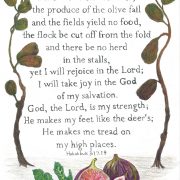Has Community Become Our New Idol?
Written by Jiaming Zeng, USA“Thirst was made for water. Inquiry for truth.” – C.S. Lewis
I’ve never been good at socializing, especially at large events such as parties, networking, and happy hours. I talk to many people, yet still walk out of events feeling like I know no one. Friends tell me that they often feel the same way.
Often it seems like over half the conversation is spent on TV shows, stories about other parties we’ve been to, or random stories about a friend’s wild adventures. Occasionally, topics as simple as “how a bike lock works” or “how to make a peanut butter sandwich” can be discussed for over 10 minutes. Is this really what we gathered to talk about? We try so hard to keep the conversation going. Yet in the end, we say so much, but communicate so little.
One of the most popular TV shows of our generation is Friends. Deep down, we all hope to find a group of friends like the original Friends—a community where we laugh at each other’s bad jokes, tolerate each other’s annoying habits, and truly believe that “I’ll be there for you, ‘cause you’re there for me too.” In a way, community has become society’s new idol, sharing the stage with fame and success. In today’s world, a fulfilling life involves more than a successful career. We want to go on unforgettable adventures, engage in meaningful experiences, and build lasting friendships.
Yet why is it that, even though we are all searching for community, and we all know we are searching for community, we still can’t seem to find the community. What is amiss in our current approach to community?
Everything we long for has a natural remedy—for thirst there is water, for hunger there is food. Does our longing for genuine connection and belonging point to a deeper need in our hearts?
Our dissatisfaction with the present state of community is a reflection of our longing for God. From the beginning, God designed us to “not be alone” (Genesis 2:18). We find fulfillment not merely in community with other people, but ultimately in community with God. His great desire for a relationship with us is why Christ gave His life on the cross.
Community isn’t just about me or what I feel. For Christians, community is important because this is where we reconnect with God and each other amidst our disjointed world. When we are a community filled with God’s love, we are able to be a witness to the world. Our redeemed relationships show the world who Christ is and what He did.
But how can we build such a community?
Building A Real Community
The Bible has many things to say about community, but I want to focus on one particular concept: Grace.
Grace is the idea of loving someone and accepting them unconditionally. For me, Jesus is the perfect source of grace and exemplifies the ideal community we are all searching for. As the Son of God, Jesus showed us perfect grace when He came to live, drink, laugh, forgive, and even sacrifice Himself for, us even though we did not earn it. In His last command, He outlined the key to ideal community for Christians: “Love each other as I have loved you” (John 15:12).
Grace is what makes hard conversations possible; it’s what allows us to be comfortable and genuine in our communities. In her famous TED Talk presentation, “The Power of Vulnerability”, Brené Brown points out that the fear of not being worthy of love or belonging is what keeps us from forming meaningful connections. Therefore, she calls for us to be vulnerable, to be authentic, and to not be afraid of who we are.
However, the fundamental reason we are afraid to be authentic and vulnerable is precisely because we don’t expect to receive grace from our communities. We’re afraid that if we do something outside the “ordinary” or accepted standard, other people in the room will judge us. We are afraid that we won’t be shown grace.
As a private and reticent person, I constantly struggle with vulnerability. Questions of doubt and fear often run through my head when I attempt to be authentic and share my life with others. What if I share too much? What if I open up and the other people don’t? What if I come across as weak and needy? I didn’t realize how much I was not sharing until a friend pointed out to me, “You know, you would talk a lot, but you really don’t say much.” By failing to be authentic, by giving in to my fear of vulnerability, I’ve distanced myself from my friends and community.
Brené’s talk is among the five most-viewed TED Talks of all time. Many of us realize the importance of vulnerability and its connection to community. Yet, we are still afraid. Brené calls for courage. While courage is admirable, not all of us, including myself, have the courage to be vulnerable. However, we do have the power to share grace. Only by showing grace to others will we find the power to be vulnerable. For “give, and it will be given to you” (Luke 6:38). Before we can receive, we must learn to give.
Sharing grace doesn’t have to be inspirational or dramatic. It can be as simple as initiating conversation with the quiet person in the room or helping your roommate with her dishes because she has a mid-term tomorrow. It can be baking cookies for your office or inviting your friends over for a home-cooked dinner. Many times, it’s the small things that matter.
Furthermore, even if you feel that your grace isn’t reciprocated with grace, show people the grace of understanding and forgiveness. Of course, don’t forget to show yourself grace. Forgive yourself for missing that paper deadline and, sometimes, it’s okay to go to that movie even if your research isn’t working. Because remember, Christ has already shown us the perfect grace. I can always find comfort in the fact that I’m loved and upheld by Him despite my mistakes. The actions of grace can be simple, yet their implications profound.
Sharing grace is what empowers us and the people around us to be vulnerable. Personally, the practice of showing grace has helped me grow closer to my friends. By inviting friends over for dinner and helping others, I’ve slowly gained the courage to trust, to open up, and to engage in deeper conversations. When we trust others in the room to show us grace, we will have the courage to be ourselves, be authentic, and be vulnerable. Grace is how we experience love in our communities. For Christian communities, grace is how we mirror God’s love to the world.
Francis Su, former president of the Mathematical Association of America, once said that you do not need accomplishments to be a worthy human being, and whatever your level of academic success, you are always worth having coffee with. That’s what grace looks like.
So that’s my call to you. Go search for a community with grace and foster grace in your existing communities. Grace is what Christian community should embody. By fostering a community built on grace, we are not only creating meaningful connections among ourselves, but also bearing witness for the cross and embodying the love of God in our broken world. For “no one has ever seen God; but if we love one another, God lives in us, and his love is made complete in us” (1 John 4:12).
Finally, as the Apostle Peter said, “Above all, love each other deeply. . . . Offer hospitality to one another without grumbling. Each of you should use whatever gift you have received to serve others, as faithful stewards of God’s grace in its various forms.” (1 Peter 4: 8-10)
P.S. I highly recommend listening to Brené Brown and Francis Su’s talks, which heavily inspired this article.
This article was originally published on Vox Clara, Vol 7 Issue 1 (Winter 2018) as “Community As the New Idol, And the Sharing of Grace”. This version has been edited by YMI.










Thanks for this good share, Jiaming!
God bless